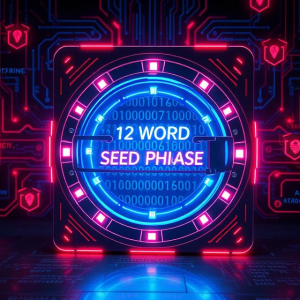Unlocking Crypto Secrets: How to Convert Mnemonic to Private Key (Step-by-Step Guide)
Introduction to Mnemonics and Private Keys
Ever heard of a “mnemonic phrase” and wondered how it unlocks the doors to your cryptocurrency? Think of it as a master key — a human-readable code that holds the power to generate everything from your wallet addresses to your private keys. In this guide, we’re diving deep into the magic of Unlock Mnemonic to Private Key Easily— using tools, code, and practical steps. We’ll answer burning questions like “Can you get a private key from a mnemonic?” and “How does BIP39 tie into all of this?”
This comprehensive walkthrough is built to empower you, whether you’re a crypto newbie, seasoned developer, or just someone recovering access to your wallet. Let’s demystify how mnemonics, seed phrases, and private keys really work.
What is a Mnemonic Phrase in Cryptocurrency?
A mnemonic phrase — also called a seed phrase or recovery phrase — is a set of human-readable words that encodes a cryptographic seed. Most commonly, it’s 12, 18, or 24 words long. Here’s a typical 12-word example:
crisp rifle onion fan genius swing rubber carbon jazz control chalk foot
This isn’t just a clever word puzzle. It’s the foundation of all your wallet’s data.
BIP39: The Backbone of Mnemonics
The standard most wallets follow for generating mnemonic phrases is BIP39 (Bitcoin Improvement Proposal 39). This standard:
- Defines a fixed wordlist (2048 common English words)
- Converts entropy (randomness) into a readable seed phrase
- Maps this phrase to a binary seed using PBKDF2 (Password-Based Key Derivation Function 2)
Once you have the seed, the rest unfolds via BIP32/44 derivation paths — think of it as navigating a folder structure to get to your keys.
Can You Convert a Mnemonic to a Private Key?
Yes, absolutely. That’s the entire point of having a mnemonic!
A mnemonic is like your master password. With it, you can derive your private key, public key, and wallet address.
The Conversion Pathway
Here’s the simplified technical route:
Mnemonic Phrase → Seed → HD Wallet Tree → Private Key → Public Key → Address
- Mnemonic Phrase: Human-readable words
- Seed: Binary output from the mnemonic
- HD Wallet Tree: Hierarchical Deterministic wallets via BIP32/44
- Private Key: Your secret pass for spending crypto
So when you search for “mnemonic to private key generator” or “mnemonic to private key Ethereum,” you’re essentially asking how to follow this pathway programmatically or via tools.
Step-by-Step Guide: Mnemonic to Private Key Conversion
Let’s get hands-on. Follow these steps to safely convert your mnemonic phrase to a private key.
Tools You’ll Need
You can either go online or offline:
- Online Tool: Ian Coleman’s BIP39 Tool (Use offline copy for safety)
- Offline GitHub Tool:
bip39packages on GitHub or Python libraries - CLI/Code Option: Python with
bip39,bip32utils,eth-account, etc.
Step 1: Input Your Mnemonic Phrase
Visit the mnemonic code converter (ideally offline). Paste your 12-word mnemonic phrase into the input box.
Ensure each word is spelled correctly and follows the BIP39 word list. Any typos will generate a different key.
You’ll see the tool instantly generate the seed, root key, and derived addresses.
Step 2: Choose Your Coin Type and Derivation Path
Cryptos use different derivation paths. Here are the common ones:
- Bitcoin:
m/44'/0'/0'/0/0 - Ethereum / MetaMask / Trust Wallet:
m/44'/60'/0'/0/0 - Solana:
m/44'/501'/0'/0'
Select the correct coin to auto-populate the derivation path.
Step 3: Extract the Private Key
Scroll to the derived addresses. You’ll see:
- Address
- Public Key
- Private Key (WIF or HEX)
Copy the private key. This is your key to controlling funds for that address.
Important: Anyone with this key can spend your coins. Never share it.
Popular Tools for Mnemonic to Private Key Conversion
Mnemonic to Private Key GitHub Repositories
Explore open-source tools like:
These provide programmable ways to convert mnemonics to private keys for Ethereum, Bitcoin, Solana, and more.
Mnemonic to Private Key Python Libraries
Python is a great choice for wallet key derivation:
mnemonicfromtrezorbip-utilseth-account
Sample snippet:
from mnemonic import Mnemonic
from bip_utils import Bip39SeedGenerator, Bip44, Bip44Coins
mnemonic = "crisp rifle onion fan genius swing rubber carbon jazz control chalk foot"
seed_bytes = Bip39SeedGenerator(mnemonic).Generate()
bip_obj = Bip44.FromSeed(seed_bytes, Bip44Coins.ETHEREUM)
print(bip_obj.PrivateKey().ToHex())
Mnemonic to Private Key Free & Online
If you’re seeking a mnemonic to private key free method, Ian Coleman’s tool is perfect — just make sure to run it offline!
Other free solutions:
- MetaMask seed import to get Ethereum keys
- Trust Wallet seed recovery (manual method)
Ethereum-Specific Tools
To convert mnemonic to private key Ethereum:
- Use
ethers.jsin JavaScript - Use
eth-accountin Python - Use MetaMask import and reveal
Solana-Specific Tools
Solana uses ed25519, so common tools won’t work.
Try:
- Solana CLI:
solana-keygen recover - Python libs:
solana-py - GitHub tools:
solana-labs/solana
Is It Safe to Convert Mnemonic to Private Key?
This is a HUGE deal. Never enter your mnemonic on a live website unless:
- You trust it 100% (and even then… don’t!)
- You’re offline (airplane mode preferred)
- You’re running an open-source, verifiable tool
Tips to Stay Safe
- Use an air-gapped device
- Avoid browser extensions
- Don’t store private keys in plaintext
- Prefer hardware wallets
FAQs and Troubleshooting
Why doesn’t my derived private key work?
You might’ve used the wrong derivation path or incorrect seed phrase. Double-check both.
Can you brute-force or guess a private key?
The odds are astronomically low (1 in 2^256). It’s practically impossible.
Is it legal to extract your own keys?
Yes, it’s your wallet and your funds. Just don’t try it on wallets you don’t own.
Why does Trust Wallet not show private keys directly?
Trust Wallet prefers showing the mnemonic. You can extract the private key using tools as described above.
Common mistakes to avoid
- Typing mnemonic words incorrectly
- Using online tools unsafely
- Ignoring derivation paths
Conclusion: Empowering Yourself with Crypto Mastery
Mastering the conversion of mnemonic to private key gives you a deeper understanding of crypto wallets, ownership, and self-custody. Whether you’re recovering lost access, building a tool, or simply learning, this knowledge is your gateway to true control over your digital assets.
Remember: with great power comes great responsibility. Your mnemonic is your vault — guard it wisely.
FAQs
1. Can I convert a 12-word seed into a private key without a wallet app?
Yes! Use offline tools like Ian Coleman’s converter or code libraries in Python/JavaScript.
2. Is converting mnemonic to private key safe?
It’s safe if done offline and carefully. Always avoid shady or unknown online services.
3. Can I generate a 12-word phrase with a balance?
While you can generate a phrase, getting one with a balance (pre-funded) is improbable unless you’re recovering a known wallet.
4. Does MetaMask allow private key export?
Yes. After importing your mnemonic, you can view private keys per account via Settings > Security.
5. Can I use this for Solana or Bitcoin too?
Absolutely — just use the correct derivation path. Solana uses m/44'/501'/0'/0' and Bitcoin uses m/44'/0'/0'/0/0.
ate key, mnemonic code to private key.



